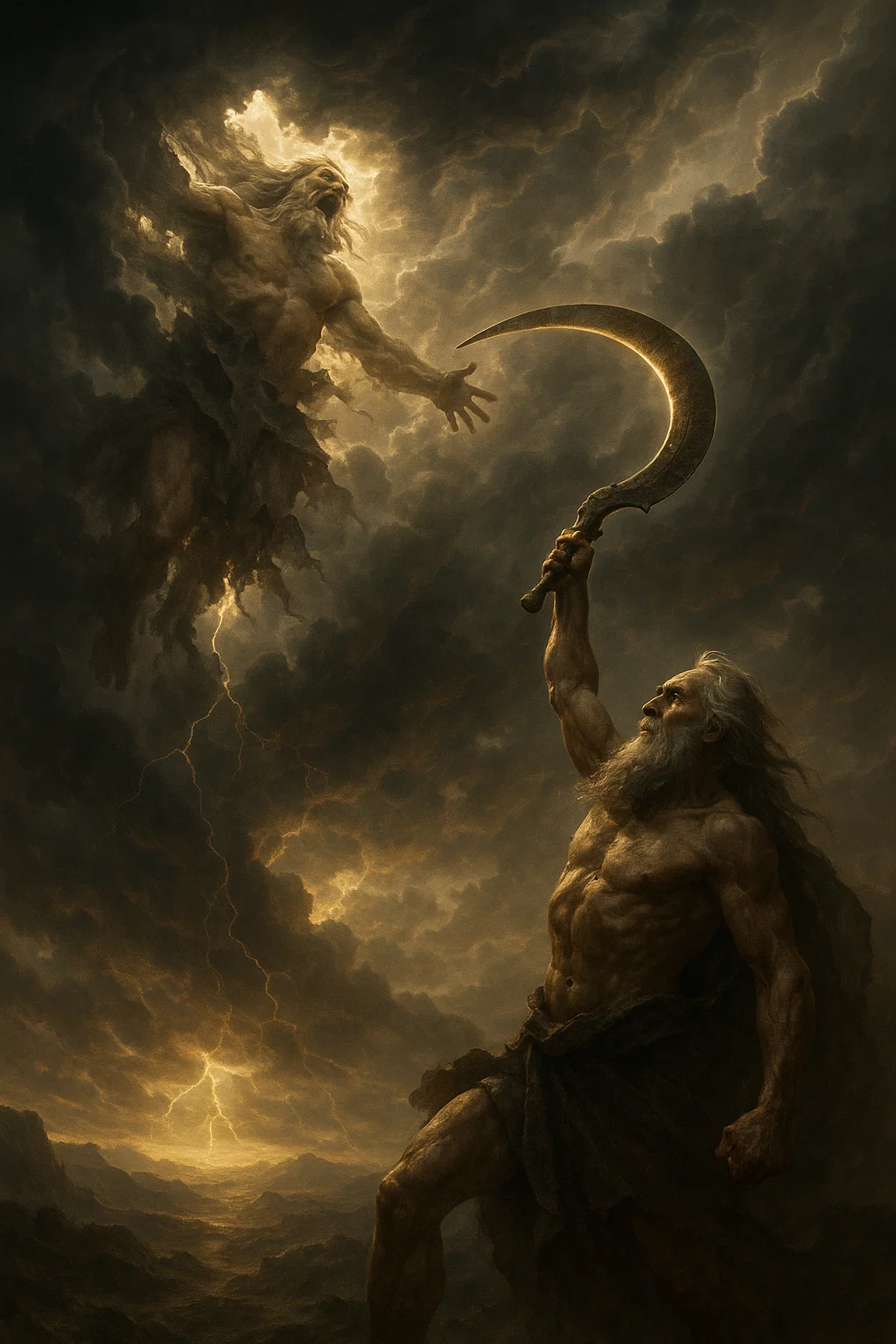
A tale of sky and earth born from chaos, and a son who overthrew his father.
🌀 The Beginning of Myth: Union of Sky and Earth
In the primal chaos, the first being to come into existence was Gaia, the goddess of Earth. She gave birth to Uranus, the god of the sky, without any assistance. Together, they became the primordial couple of mythology, symbolizing creation. Their offspring included the Titans, the Cyclopes, and the Hecatoncheires—beings symbolizing heaven, earth, and the forces of nature.
🔐 Uranus' Fear and the Imprisonment of His Children
Uranus, fearing the grotesque forms and strength of his children—especially the one-eyed Cyclopes and the hundred-handed Hecatoncheires—heard a prophecy that they would one day overthrow him. In fear, he locked them deep within Gaia’s body, inside Tartarus.
🌱 Episode: Gaia's Agony
"I can no longer bear this pain of having my children trapped within me."
Gaia experienced physical suffering every time her children writhed within Tartarus. Unable to tolerate the injustice, she decided to rebel.
🔪 Gaia's Rebellion: A Mother’s Revenge
Gaia gathered her children and urged them to punish their father. All lowered their heads in fear—except for the youngest, Cronus. Gaia handed Cronus a sickle and said, "Let him live in fear as he has made you do."
⚡ Cronus’ Resolve and Uranus’ Fall
When night fell and Uranus descended upon Gaia, Cronus ambushed him and castrated him. Uranus screamed in agony, and his genitals fell into the sea. From the sea foam that arose, Aphrodite, the goddess of love and beauty, was born—not from blood, but from the foam generated by the fallen flesh, as ancient texts describe.
Uranus' blood also gave birth to the Furies (Erinyes), the Giants (Gigantes), and other divine beings.
🌐 Episode: The Symbolism of the Severed Sky
Sky and earth no longer united after the event—symbolizing the separation of divine and mortal realms. Philosophers interpreted this as the rift between worlds: gods and humans estranged.
🧠 Allegory in Myth: Power and the Shadow of the Father
Though Cronus overthrew Uranus and became ruler of the cosmos, he too heard a prophecy—that he would be overthrown by one of his children. Gripped by fear, Cronus began devouring his own offspring.
This is no mere family feud—it symbolizes the cycle of power, intergenerational conflict, and the grotesque repetition of injustice. The son who overthrew the father eventually fears his own children. It is a metaphor for every tyrant’s fate in human history.
📋 Summary Table of Characters
| Name | Role and Personality | Notes |
|---|---|---|
| Uranus | God of the Sky, Creator | Imprisoned his children in Tartarus |
| Gaia | Goddess of the Earth, Mother of Life | Planned the rebellion to free her children |
| Cronus | Youngest Titan, God of Time | Overthrew his father and seized power |
| Cyclopes | One-eyed Giants | Feared and imprisoned by Uranus |
| Hecatoncheires | Giants with 100 arms | Viewed as a threat by Uranus |
| Erinyes | Goddesses of Vengeance | Born from Uranus’ blood |
| Aphrodite | Goddess of Love and Beauty | Born from sea foam after Uranus’ fall |
✨ Conclusion
“The Fall of Uranus and the Rise of Cronus” is not merely a tale of divine strife—it’s a symbolic reflection on politics, generational tension, and how fear corrupts power. Even today, the myth resonates, warning us of the tragedy that follows repression and the vicious cycle born of fear.
'고전의 확장 > Greek & Roman Mythology' 카테고리의 다른 글
| Episode 6 – Poseidon: The Might of the Sea God (0) | 2025.07.05 |
|---|---|
| Episode 5 – Zeus vs. Hera: The Mythological Origin of Marital Conflict (0) | 2025.07.05 |
| Episode 4 – The Completion of the 12 Olympians (0) | 2025.07.05 |
| Episode 3 – The Birth of Zeus and the Titan War (0) | 2025.07.04 |
| Episode 1: The Beginning from Chaos – Chaos and Gaia (0) | 2025.07.03 |



